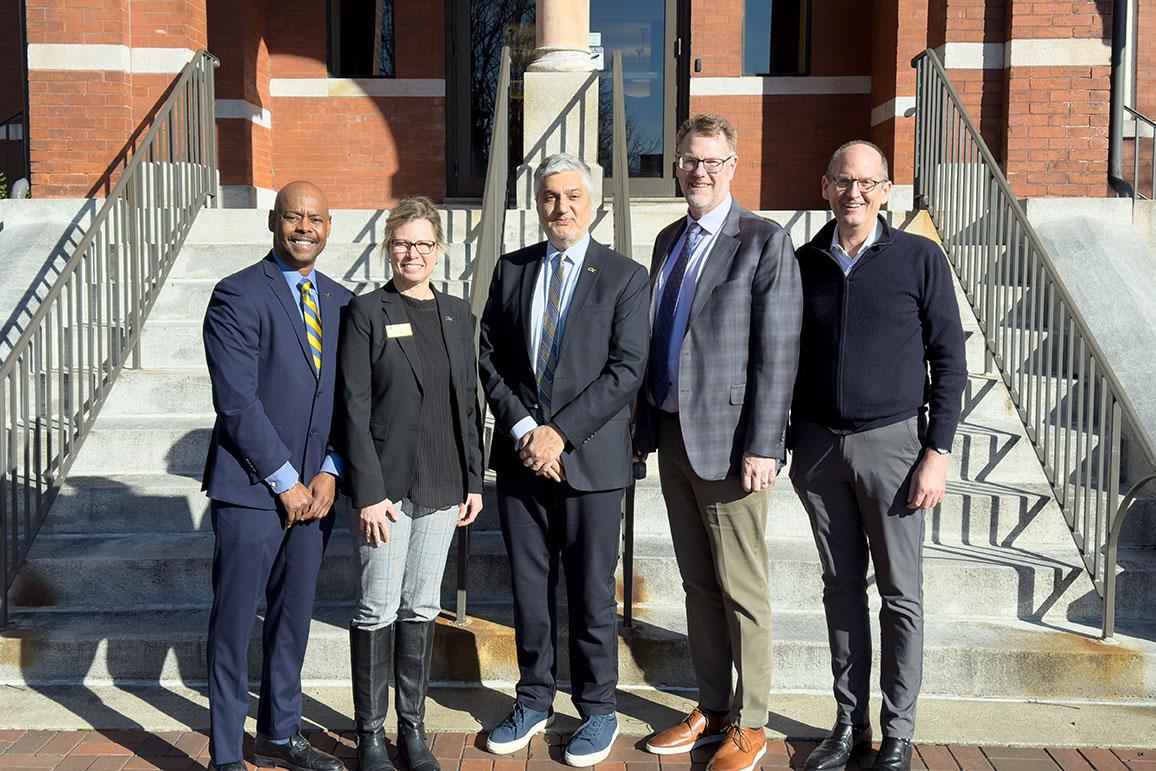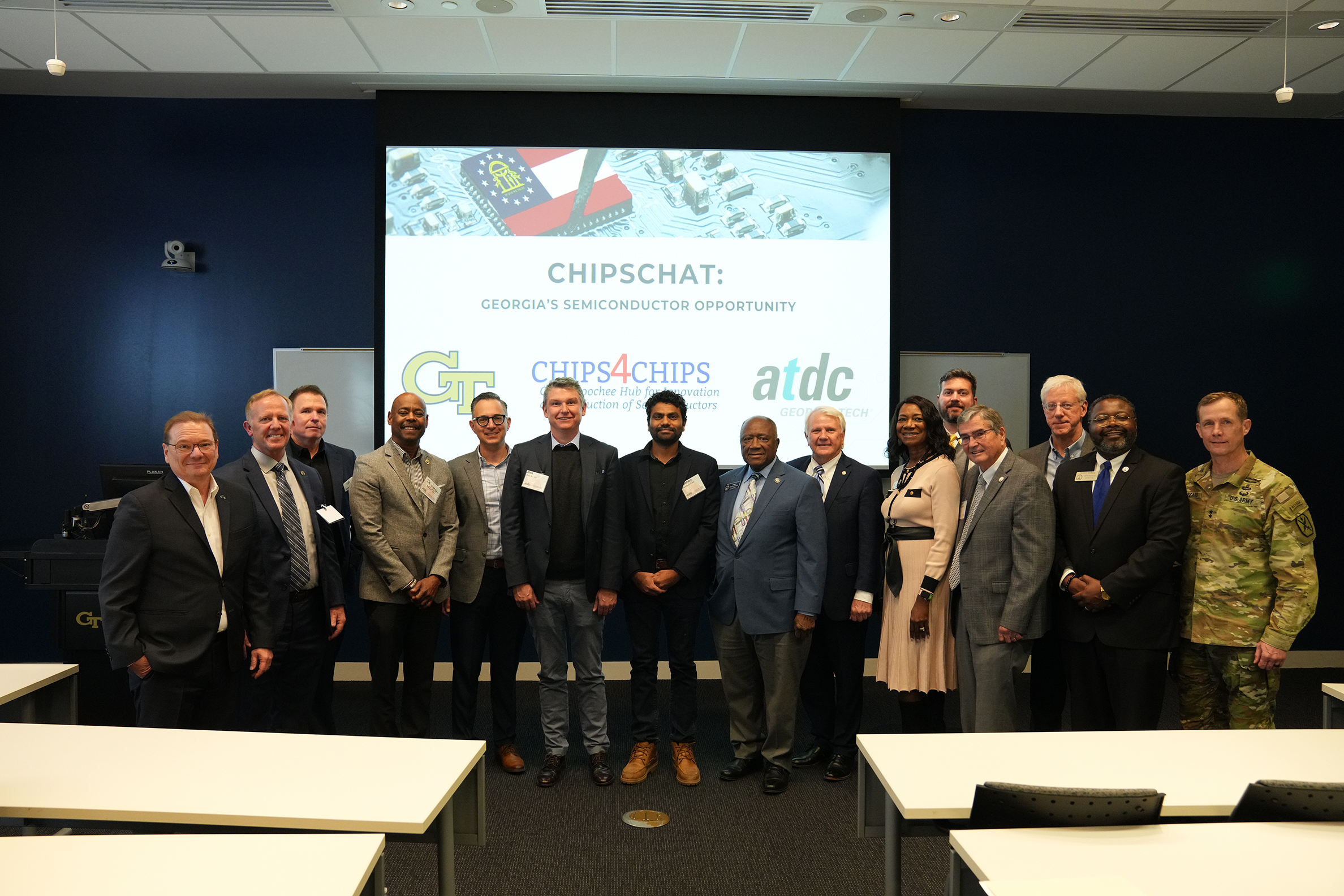Energy Materials: Driving the Clean Energy Transition
Feb 21, 2024 — Atlanta, GA

Energy is everywhere, affecting everything, all the time. And it can be manipulated and converted into the kind of energy that we depend on as a civilization. But transforming this ambient energy (the result of gyrating atoms and molecules) into something we can plug into and use when we need it requires specific materials.
These energy materials — some natural, some manufactured, some a combination — facilitate the conversion or transmission of energy. They also play an essential role in how we store energy, how we reduce power consumption, and how we develop cleaner, efficient energy solutions.
“Advanced materials and clean energy technologies are tightly connected, and at Georgia Tech we’ve been making major investments in people and facilities in batteries, solar energy, and hydrogen, for several decades,” said Tim Lieuwen, the David S. Lewis Jr. Chair and professor of aerospace engineering, and executive director of Georgia Tech’s Strategic Energy Institute (SEI).
That research synergy is the underpinning of Georgia Tech Energy Materials Day (March 27), a gathering of people from academia, government, and industry, co-hosted by SEI, the Institute for Materials (IMat), and the Georgia Tech Advanced Battery Center. This event aims to build on the momentum created by Georgia Tech Battery Day, held in March 2023, which drew more than 230 energy researchers and industry representatives.
“We thought it would be a good idea to expand on the Battery Day idea and showcase a wide range of research and expertise in other areas, such as solar energy and clean fuels, in addition to what we’re doing in batteries and energy storage,” said Matt McDowell, associate professor in the George W. Woodruff School of Mechanical Engineering and the School of Materials Science and Engineering (MSE), and co-director, with Gleb Yushin, of the Advanced Battery Center.
Energy Materials Day will bring together experts from academia, government, and industry to discuss and accelerate research in three key areas: battery materials and technologies, photovoltaics and the grid, and materials for carbon-neutral fuel production, “all of which are crucial for driving the clean energy transition,” noted Eric Vogel, executive director of IMat and the Hightower Professor of Materials Science and Engineering.
“Georgia Tech is leading the charge in research in these three areas,” he said. “And we’re excited to unite so many experts to spark the important discussions that will help us advance our nation’s path to net-zero emissions.”
Building an Energy Hub
Energy Materials Day is part of an ongoing, long-range effort to position Georgia Tech, and Georgia, as a go-to location for modern energy companies. So far, the message seems to be landing. Georgia has had more than $28 billion invested or announced in electric vehicle-related projects since 2020. And Georgia Tech was recently ranked by U.S. News & World Report as the top public university for energy research.
Georgia has become a major player in solar energy, also, with the announcement last year of a $2.5 billion plant being developed by Korean solar company Hanwha Qcells, taking advantage of President Biden’s climate policies. Qcells’ global chief technology officer, Danielle Merfeld, a member of SEI’s External Advisory Board, will be the keynote speaker for Energy Materials Day.
“Growing these industry relationships, building trust through collaborations with industry — these have been strong motivations in our efforts to create a hub here in Atlanta,” said Yushin, professor in MSE and co-founder of Sila Nanotechnologies, a battery materials startup valued at more than $3 billion.
McDowell and Yushin are leading the battery initiative for Energy Materials Day and they’ll be among 12 experts making presentations on battery materials and technologies, including six from Georgia Tech and four from industry. In addition to the formal sessions and presentations, there will also be an opportunity for networking.
“I think Georgia Tech has a responsibility to help grow a manufacturing ecosystem,” McDowell said. “We have the research and educational experience and expertise that companies need, and we’re working to coordinate our efforts with industry.”
Marta Hatzell, associate professor of mechanical engineering and chemical and biomolecular engineering, is leading the carbon-neutral fuel production portion of the event, while Juan-Pablo Correa-Baena, assistant professor in MSE, is leading the photovoltaics initiative.
They’ll be joined by a host of experts from Georgia Tech and institutes across the country, “some of the top thought leaders in their fields,” said Correa-Baena, whose lab has spent years optimizing a semiconductor material for solar energy conversion.
“Over the past decade, we have been working to achieve high efficiencies in solar panels based on a new, low-cost material called halide perovskites,” he said. His lab recently discovered how to prevent the chemical interactions that can degrade it. “It’s kind of a miracle material, and we want to increase its lifespan, make it more robust and commercially relevant.”
While Correa-Baena is working to revolutionize solar energy, Hatzell’s lab is designing materials to clean up the manufacturing of clean fuels.
“We’re interested in decarbonizing the industrial sector, through the production of carbon-neutral fuels,” said Hatzell, whose lab is designing new materials to make clean ammonia and hydrogen, both of which have the potential to play a major role in a carbon-free fuel system, without using fossil fuels as the feedstock. “We’re also working on a collaborative project focusing on assessing the economics of clean ammonia on a larger, global scale.”
The hope for Energy Materials Day is that other collaborations will be fostered as industry’s needs and the research enterprise collide in one place — Georgia Tech’s Exhibition Hall — over one day. The event is part of what Yushin called “the snowball effect.”
“You attract a new company to the region, and then another,” he said. “If we want to boost domestic production and supply chains, we must roll like a snowball gathering momentum. Education is a significant part of that effect. To build this new technology and new facilities for a new industry, you need trained, talented engineers. And we’ve got plenty of those. Georgia Tech can become the single point of contact, helping companies solve the technical challenges in a new age of clean energy.”
Georgia Tech and Micron Collaborate to Expand Access to Engineering Education
Feb 15, 2024 —

From Left: George White, Julia Kubanek, Chaouki T. Abdallah, Scott DeBoer, Steve McLaughlin
The Georgia Institute of Technology today announced the signing of a master research agreement with Micron Technology, a global leader in memory and storage solutions. Under the new agreement, the two organizations will expand their collaborative efforts in providing students with experiential research opportunities and expanding access to engineering education.
“We are proud to join forces with Georgia Tech, home to some of the nation’s top programs, to expand students’ opportunities in STEM education,” said Scott DeBoer, executive vice president of Technology and Products at Micron. “This collaboration will help push the boundaries in memory technology innovation and ensure we prepare the workforce of the future.”
“We believe that when academia and industry converge, the best ideas flourish into game-changing innovations,” said Chaouki T. Abdallah, executive vice president for Research at Georgia Tech. “The synergy between Micron and Georgia Tech has already been tremendously fruitful, and we are so excited for the boundless opportunities on our shared horizon.”
“The signing of the master research agreement represents a significant step towards increasing additional collaboration pathways between Micron and GT including the joint pursuit of major federal funding activities, technology transfer, student internships and technology transfer,” said George White, senior director of Strategic Partnerships at Georgia Tech.
The first project under the agreement is already underway. Saibal Mukhopadhyay, professor in the School of Electrical and Computer Engineering, is leading the research efforts titled “Configurable Processing-In-Memory.” This cutting-edge research will enable memory devices to work faster and more efficiently.
Nano@Tech Spring 2024 Series | MEMS and Integrated Instruments: What does the future hold?
Abstract: MEMS and integrated sensors have seen tremendous research and development activities over the past three decades and been instrumental in the success of many devices, ranging from airpods to implantable medical sensors. Silicon-based physical sensors and actuators have matured across different modalities with a myriad of devices being commercially available and used indispensably in automotive, consumer and medical applications. In this talk, I will discuss opportunities that can fuel the growth of MEMS research and development over the next decades.
13th Annual Southeastern Pediatric Research Conference
Please join us for the 2024 Annual Southeastern Pediatric Research Conference, held at the Georgia Tech Hotel and Conference Center on June 7th from 8am to 5pm. Bringing together basic and clinical researchers with pediatricians and healthcare providers, this event promotes the integration of cutting-edge research into clinical practice. This year's conference theme is "Pediatric Research in the Digital Age: Innovation, Collaboration, and Translation." All areas of child health research will be represented.
Nano@Tech Spring 2024 Series | Multiscale Modeling and Simulation Approach Transforming Design, Discovery, and Development of Advanced Materials
Abstract: Recent advancements in computational methods within the fields of fundamental science, such as chemistry and physics, have established them as invaluable tools across various domains within materials science.
GEDC Distinguished Lecture | Frontiers in RFID-Sensing: Evolution, Advancements and Opportunities in the IoT Era
Abstract: This talk will explore the evolution and future potential of RFID-Sensing, aiming to inspire young researchers to venture into the field of RFID and RFID-Sensing. Drawing from the extensive research at the Department of Innovation Engineering of the University of Salento, the talk will cover 15 years of advancements in integrating UHF RFID technology with sensors, alongside projections for future concepts in the realm of emerging technologies.
GEDC Distinguished Lecture | Radiation Effects on Spacecrafts
Abstract: Space can be a harsh environment for electrical components due to large temperature swings and the presence of high-energy particles. This talk will focus on the radiation effects associated with high-energy particles found in space and their impact on spacecrafts. We will initially cover some basic history of radiation effects and its associated physics. Afterwards, the radiation effects will be tied to system-level impact in spacecrafts and potential mitigation options.
Marta Hatzell Wins ACS Sustainable Chemistry & Engineering Lectureship Award
Jan 26, 2024 — Atlanta, GA

Associate Professor Marta Hatzell has won a 2024 ACS Sustainable Chemistry & Engineering Lectureship Award, which recognizes leading contributions of scientists and engineers active in the general fields of green chemistry, green engineering, and sustainability in the broadest sense of the chemical enterprise.
Hatzell, who holds joint appointments in Georgia Tech's School of Mechanical Engineering and School of Chemical and Biomolecular Engineering, was honored for her multiple contributions that drive the application of electrochemistry to enable critical systems with enhanced circularity.
The ACS Sustainable Chemistry & Engineering Lectureship awards were created to celebrate early to midcareer investigators who completed academic training no more than 10 years prior to nomination. In support of their commitment to nurture and stimulate a global community of outstanding practice. ACS Sustainable Chemistry & Engineering and the ACS Green Chemistry Institute gave three Lectureship Awards to recognize outstanding levels of contribution from The Americas, Europe/Middle East/Africa, and Asia/Pacific.
The award recipients will be honored at a joint plenary session of the 28th Annual Green Chemistry & Engineering Conference in their honor (June 3–5, 2024; https://www.gcande.org/).
Brad Dixon, Communications Manager, School of Chemical and Biomolecular Engineering
Science and Engineering Day at Georgia Tech
Members of the Georgia Tech community are opening their doors once again as part of the 11th annual Atlanta Science Festival. This year, Science and Engineering Day at Georgia Tech will serve as the kickoff event for the entire festival!
Bold Move to Columbus Marks First Semiconductor Manufacturer in Region
Jan 24, 2024 —
Prashant Patil, founder and CEO of Micromize, explains to a coalition of business, civic, and military stakeholders from Columbus, Georgia and Georgia Tech leaders why he opted to relocate his company to Columbus, Georgia from Massachusetts. (PHOTO: Chris Ruggiero)
The move is the result of strategic partnerships between Micromize, CHIPS4CHIPS (Chattahoochee Hub for Innovation and Production of Semiconductors/C4C), and several programs at Georgia Tech’s Enterprise Innovation Institute, including its Advanced Technology Development Center (ATDC), its Georgia Manufacturing Extension Partnership, and the Center for Economic Development Research. It also signifies a collaborative effort to harness the cutting-edge innovations in semiconductor packaging available at Tech’s Institute for Electronics and Nanotechnology.
"Our decision to locate in Columbus was driven by several crucial factors, and we are thrilled about the opportunities that this vibrant city presents for our growth and development,” said Prashant Patil, Micromize founder and CEO. “The work of CHIPS4CHIPS in supporting the semiconductor industry is commendable, and we are excited to be part of this innovative ecosystem.”
This exciting development was announced Tuesday, Jan. 23, at the Marcus Nanotechnology Center on Georgia Tech’s campus to a large group of state legislators and other state officials, a delegation of business and civic leaders from Columbus, and leadership from Georgia Tech and ATDC. The announcement is a true look at how statewide partnerships can lead to success for the Columbus region.
Micromize, a spinoff of the Massachusetts Institute of Technology, selected Georgia as its new home, in part, to take advantage of the semiconductor packaging expertise at Georgia Tech. The company plans to establish its headquarters and manufacturing facility in Columbus, further solidifying its presence in the state’s vibrant technology ecosystem. Additionally, Micromize will center its cutting-edge research and development on Georgia Tech's campus.
"The collaboration with Micromize is a significant milestone for CHIPS4CHIPS and the entire region,” said Ben Moser, president and CEO of United Way of the Chattahoochee Valley and chair of CHIPS4CHIPS. “This announcement marks the first of what we believe will be many to come, and we are thankful that Micromize recognizes the potential of our region for this industry. Columbus is poised for remarkable development, and we look forward to the positive impact that Micromize will bring to our community.”
The strategic relocation is expected to create significant economic opportunities in the region. Micromize will bring 20-25 jobs to Columbus through its headquarters and manufacturing facility, contributing to the local workforce, and fostering growth.
Micromize will center its Research & Development Lab at Georgia Tech’s 3D Systems Packaging Research Center, which is regarded as the world’s best for semiconductor packaging research. This partnership represents a synergistic collaboration of industry leaders, research institutions, and the entrepreneurial ecosystem. Micromize's move to Columbus not only underscores the city's growing prominence as a technology hub, but also highlights the collaborative efforts driving innovation and economic development in the state of Georgia.
In addition to C4C’s nationally recognized workforce development efforts, the Fort Moore Army base, and its skilled workforce, the region’s proximity to a port and airport will facilitate efficient shipping, and Columbus played a pivotal role in supporting the company by providing essential infrastructure, he said.
“Our collaboration with Georgia Tech enriches our talent pool, adds exponentially to our research and development capabilities, and access to mentorship at ATDC enhances our commercialization potential,” Patil said. “We are also proud to be part of the effort to revitalize semiconductor manufacturing in the United States, with Columbus serving as our starting point as we embark on this exciting journey of growth and innovation.”
Georgia Tech, a leader in microchips and nanotechnology research, innovation, and fabrication, provides fertile ground for Micromize's relocation. The Institute’s commitment to advancing semiconductor technology aligns with the national push at the federal level (via the CHIPS and Science Act) to bring more semiconductor production to the U.S., making it more competitive in research, development, and manufacturing.
“As the state’s technology startup incubator, we’re excited to welcome Micromize into our portfolio and to support them into the next phase of growth and expansion,” said ATDC Director John Avery.
“Microchips, semiconductor packaging, and microelectronics are critical to our national economy and national security. Micromize’s choosing Georgia as its home to grow reflects what is proving to be a successful model when business, government, and research institutions such as Georgia Tech collaborate.”

A coalition of business and civic leaders from Columbus, Georgia and several programs at Georgia Tech, including ATDC, announced Jan. 23, 2024, that semiconductor manufacturer, Micromize, is relocating to Georgia from Massachusetts. (PHOTO: Chris Ruggiero)
David Bridges, vice president of Georgia Tech's Enterprise Innovation Institute, speaks with Maj. Gen Curtis A. Buzzard, commanding general of the United States Army Maneuver Center of Excellence and Fort Moore in Columbus. Because of its skilled workforce, Fort Moore was one reason Micromize selected Georgia for its manufacturing facility. (PHOTO: Chris Ruggiero)
Georgia House Rep. Richard Smith, (R-Columbus), chairman of the Rules Committee, discusses how the collaboration that led to Micromize coming to Columbus could serve as a blueprint for more semiconductor companies developing in or moving to Georgia. (PHOTO: Chris Ruggiero)
Péralte C. Paul
404.316.1210
peralte@atdc.org
